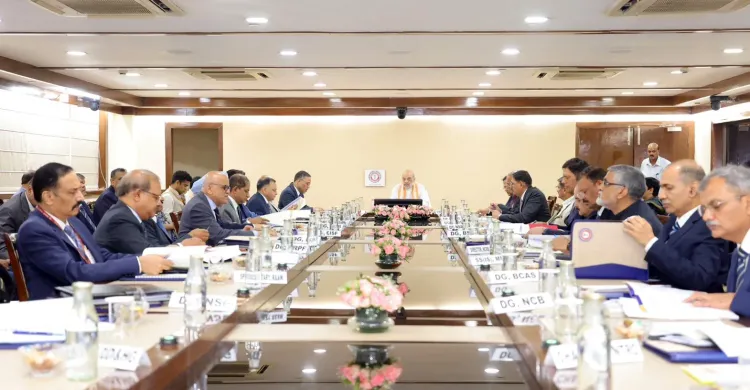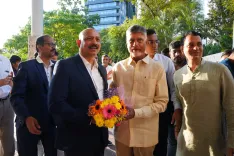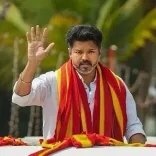How Did the National Security Conference Conclude with a Call for Unified Strategy and Vigilance?

Synopsis
Key Takeaways
- Unified Strategy: Emphasis on inter-agency cooperation and data sharing.
- Real-Time Data: Need for a robust data-sharing ecosystem.
- Focus on Youth: Engaging young officers in tackling emerging threats.
- Regional Development: Implementation of over 300 schemes in affected areas.
- Safety First: Prioritizing the protection of citizens' lives and property.
New Delhi, July 26 (NationPress) The eighth installment of the National Security Strategies Conference (NSSC) reached its conclusion in New Delhi on Saturday, highlighted by a significant address from Union Home Minister Amit Shah, representing a critical juncture in India’s evolving internal security framework.
The event, coinciding with Kargil Vijay Diwas, honored the sacrifices of fallen soldiers and commended the Armed Forces and Border Security Force for their pivotal role in Operation Sindoor—a decisive counter-terror initiative that reinforced Prime Minister Narendra Modi’s unwavering zero-tolerance policy towards terrorism.
During his address, the Home Minister pointed out that India's rise as the world’s fourth-largest economy brings forth intricate security challenges. He urged for a strong, real-time data-sharing ecosystem and advocated for the creation of integrated teams composed of central and state agencies to formulate and oversee national security strategies.
The conference concluded with an emphasis on the necessity for police forces across all states and central investigative bodies to strive towards becoming the best globally, stressing that a reliable ecosystem for real-time data sharing is essential to meet national challenges. Furthermore, all agencies should adopt a security-first mindset, habitual vigilance, and seamless coordination as fundamental elements of their operational approach.
Young police officials from various states will participate in brainstorming sessions aimed at tackling emerging threats, integrating national databases like NATGRID, NIDAAN, iMoT, and the CBI’s fugitive tracker into their training regimens.
Highlighting the Modi government’s achievements in addressing long-standing regional issues, the Home Minister stated that the next five to ten years will be pivotal for India’s growth and security. He encouraged police forces to embrace the motto 'Suraksha, Sajagta and Samanvay' (Security, Alertness, and Coordination) and advocated for a unified effort in implementing new criminal laws and combating narcotics.
A comprehensive strategy was suggested to dismantle drug cartels and expedite the extradition of narcotics offenders. Police stations, viewed as the nerve centers of intelligence gathering, were instructed to develop credible platforms for real-time information exchange.
The Union Home Minister also highlighted the critical importance of safeguarding citizens’ lives, property, and dignity, urging police forces to pursue excellence and foster healthy competition. He called for collaborative efforts between DGPs and state administrations to execute over 300 development schemes in areas affected by Left-Wing Extremism, emphasizing the need to secure smaller seaports to thwart infiltration and smuggling.
The conference wrapped up with a renewed commitment to enhancing national resilience, inter-agency cooperation, and proactive policing, preparing India’s security framework to address the demands of an ever-evolving geopolitical landscape.







